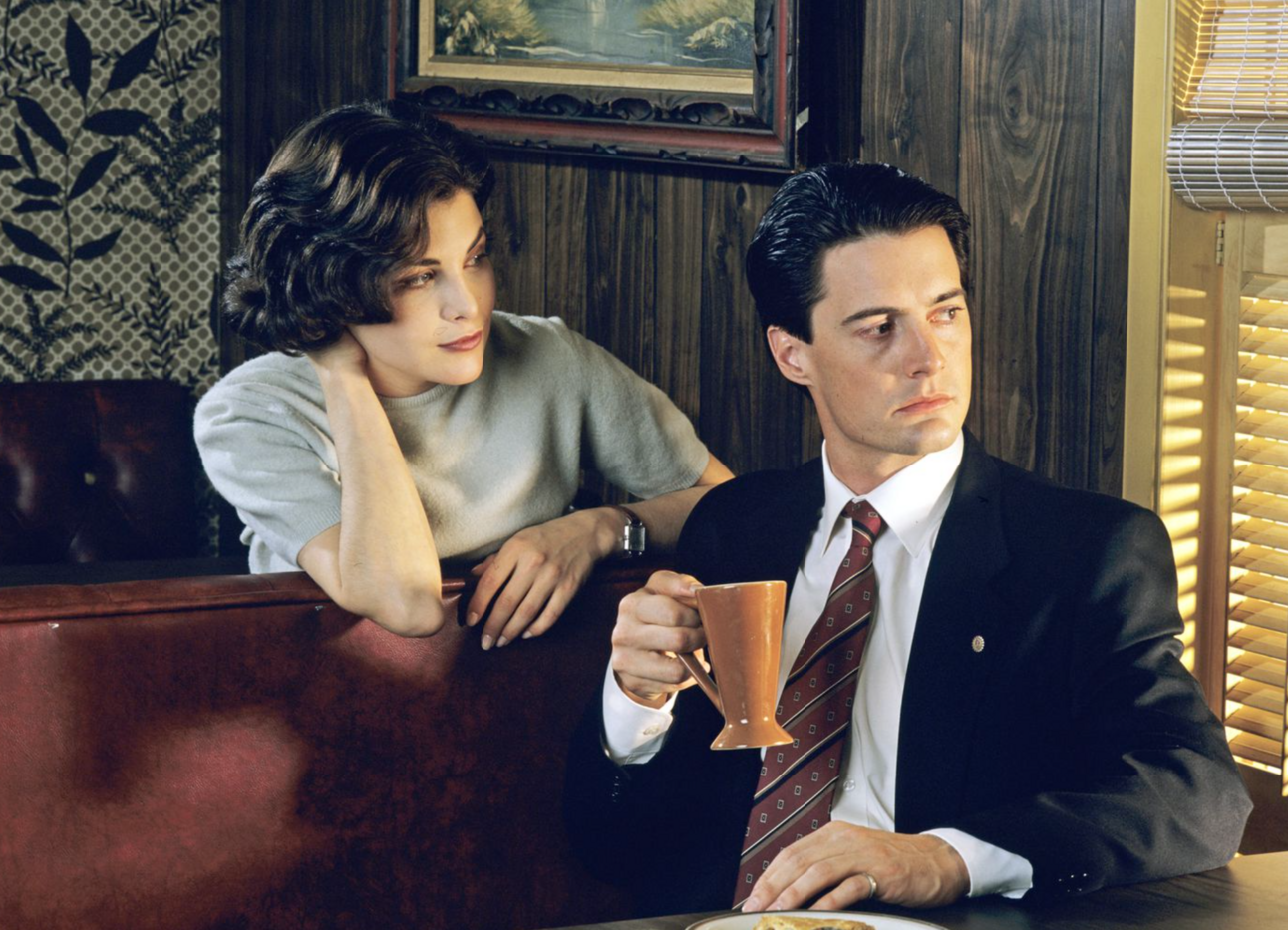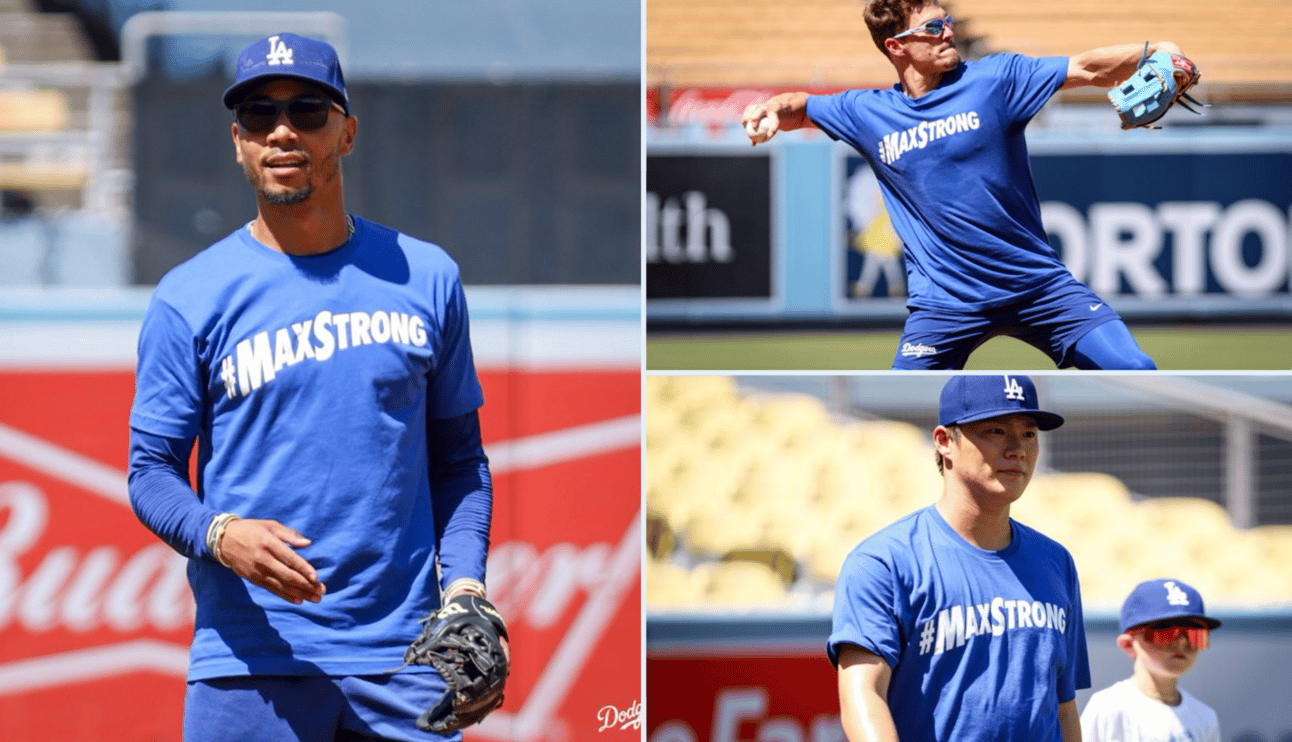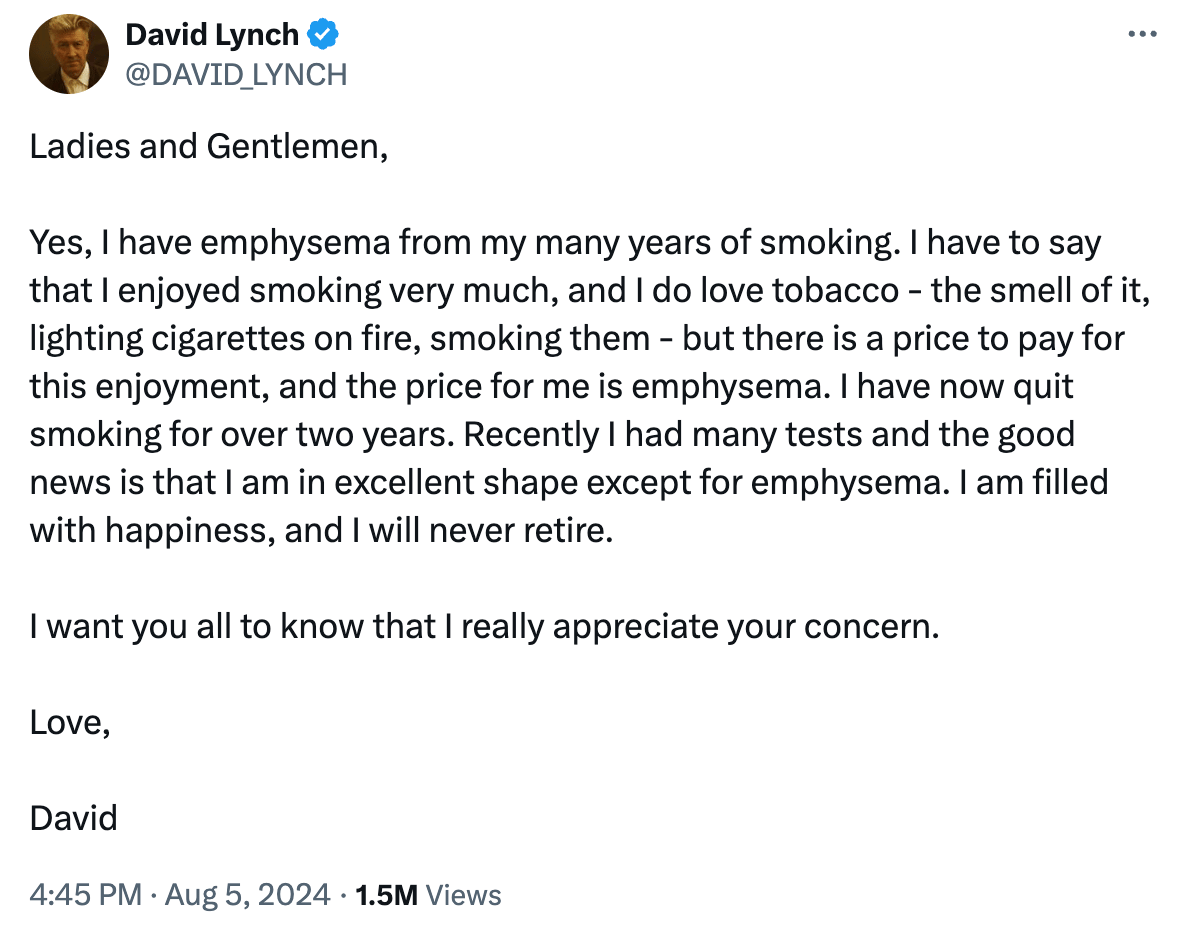Cup of Coffee: August 6, 2024
Freddie Freeman returns, a statue thief is sentenced, Google is a monopoly, RFK Jr. and the bear, John Hinckley Jr., and David Lynch

Good morning!
There was a heartwarming moment in Los Angeles yesterday and a criminal sentencing in Kansas. And apart from the games, that was about all the news there was. Post trade-deadline dog days, babies. Get used to the lull.
In Other Stuff, however, we talk about Google being ruled a monopoly, That wild RFK Jr. story about the bear, we catch up with John Hinckley Jr., and we get some bad news about David Lynch.
And That Happened
Here are the scores. Here are the highlights:
Mets 6, Cardinals 0: Sean Manaea went seven, blanked the Redbirds the whole time, and struck out 10 while scattering six hits. It’s the second time in a row he’s tossed seven frames of goose eggs. Harrison Bader hit an RBI double and then Tyrone Taylor hit a bases-clearing, bases-loaded double in a four-run fifth. Jeff McNeil homered late. Pete Alonso scored on a wild pitch early.
Reds 10, Marlins 3: Before the game, Jeff Passan was tweeting about an interview he had just done with Elly De La Cruz:

Then he went out and hit a two-run homer in the first, doubled in the fourth and sixth innings, and hit a solo homer in the eighth to lead the blowout. So, point to Elly De La Cruz. While it came in a losing cause, Jesús Sánchez hit longest home run of the season, launching a 480-foot blast against Jakob Junis in the sixth.
Giants 4, Nationals 1: Matt Chapman homered for the third game and Tyler Fitzgerald went deep for the second straight game. Fitzgerald has now hit 11 homers in his past 17 games. Logan Webb was solid into the sixth inning, beating Patrick Corbin. I read in the game story that if Corbin had won it would’ve been his 100th career win. If someone had offered to bet me on that yesterday afternoon I would’ve but at least a hundo on him not being close.
Diamondbacks 7, Guardians 6: Ketel Marte and Gabriel Moreno hit back-to-back homers but that didn’t begin a rout of any kind. Indeed, there were four lead changes and five ties in this one. The Guardians had forced extra innings on Daniel Schneemann’s sacrifice fly in the ninth but Eugenio Suárez singled in the Manfred Man in the tenth to break the tie and to, eventually, give Arizona the win. Bad news for the Dbacks, though: they lost catcher Gabriel Moreno after he suffered a strained left groin while legging out a single in the second, so he’ll be on the shelf for a bit.
Twins 3, Cubs 0: Minnesota starter David Festa struck out nine over five innings. Four relievers finished off the four-hit, 14-strikeout shutout. Manuel Margot homered in the fifth. The Twins pull to within 3.5 games of Cleveland. That’s the closest the Twins have been to first place since May 18.
Red Sox 9, Royals 5: The Sox had 18 hits — Masataka Yoshida had four of them — and Jarren Duran knocked in three runs while James Paxton allowed two runs over six frames. Boston, which has won four of its last five, now trails the Royals by only a game and a half for the final American League Wild Card spot.
Rangers 4, Astros 3: Corey Seager’s solo homer in the eighth — his fourth in the last four games — tied things up at two and forced extras. Once in overtime, Houston took a 3-2 lead in the top of the tenth inning thanks to back-to-back hit batsman, but Josh Smith hit a two-out, two-run shot in the bottom half to walk the game off for the Rangers. Texas is creeping up, ever so slowly, on Houston and Seattle in the west. They’re three and a half back of the former and five back of the latter.
Athletics 5, White Sox 1: Max Schuemann hit a tiebreaking, two-run single in the fourth and the A’s didn’t look back. Which makes it twenty-one straight losses now for Chicago, which ties the American League record it now co-holds with the 1988 Orioles. The modern NL record is held by the 1961 Philadelphia Phillies, who lost 23 straight. The all-time small-m major league record belongs to the the 1889 Louisville Colonels of the American Association which lost 26 consecutive games during a 27-111 season. I like Chicago’s chances.
Dodgers 5, Phillies 3: It was an emotional day at Dodger Stadium — see about that below in the Daily Briefing — which ended as a happy day for the men in blue as Teoscar Hernández hit a tie-breaking, two-run homer in the third inning and Shohei Ohtani went deep in the eighth. Tyler Glasnow was uneven, as he retired the Phillies in order four times in his six innings of work, striking out nine but still managing to give up three runs on four hits. But when the dingers are on your side you can get away with that.
The Daily Briefing
The Dodgers support Maximus Freeman
I was remiss in not mentioning it here before, but Freedie Freeman’s three year old son Maximus has been really sick of late. Between July 22 and July 25 he developed full-body paralysis which affected his breathing and he was taken to the hospital and was placed on a ventilator and a feeding tube. After an initial belief that he was having a reaction to a virus, Max was diagnosed with Guillan-Barré syndrome, and spent eight days in the hospital. Thankfully, he has recovered considerably and he returned home on Sunday. There is no cure for Gullian-Barré, but Maximus is out of the woods.
Freeman rejoined the Dodgers yesterday after missing the entire eight-game road trip that they completed on Sunday. He sat for a very emotional press conference before the game in which he talked about the harrowing ten days his family went through. Quote of the presser: “ . . . when it’s your son or your child, and he can’t breathe on his own, that was hard . . . I know Dodgers fans wouldn’t like this, but I would gladly strike out with the bases loaded in the bottom of the ninth inning in Game 7 of the World Series 300 million times in a row than to see that again.” That’s real dad stuff.
Before that Freeman was met by his teammates wearing shirts which said #MaxStrong on them — and “Freeman” and number 5 on the back — in support of the Freemans, wearing them through pregame warmups:

When asked about that, Freeman said “I don’t know whose idea it was, but that was the first time I cried today, when I walked in and saw those. It means a lot. The support from this organization has been . . . there’s no words.”
Here’s hoping a steady and continued recovery is in the cards for Maximus Freeman.
The Jackie Robinson statue thief was sentenced
You’ll recall that earlier this year someone stole and then destroyed a statue of Jackie Robinson at a Little League field in Wichita, Kansas. That someone — a 45 year old man named Ricky Alderete — was arrested for the theft. In May he pleaded guilty to theft and some other charges. On Friday, The Athletic Reports, Alderete was sentenced to 15 years in prison.
To be sure, the bulk of that was not actually related to the theft/destruction of the Robinson statue. Rather, it was mostly based on a case of aggravated burglary that he committed a week later. Oh, and he was on probation for another crime already. The statue theft accounted for only 18 months of that.
Other Stuff
Google ruled a monopoly
Federal Judge Amit Mehta of the U.S. District Court for the District of Columbia ruled yesterday that Google broke antitrust laws to maintain its dominance over online search. From his ruling:
“After having carefully considered and weighed the witness testimony and evidence, the court reaches the following conclusion: Google is a monopolist, and it has acted as one to maintain its monopoly. It has violated Section 2 of the Sherman Act.”
You can read the full ruling here if you’re an interested party, a law geek, or a masochist. Summaries are just fine for normal people. Just know that the judge held that Google has a monopoly in “general search services” and “general search text advertising.”
As for the specific practices which offended: The DOJ successfully argued that Google illegally entered into exclusionary contracts with browser makers like Mozilla and phone manufacturers like Apple and Samsung to make its search engine the default. Google also made access to the Play Store for phone manufacturers using the Android operating system contingent on them making Google the default search engine. A particularly fun fact: he found that, per Google's internal numbers, the company would lose up to 80% of searches on Apple devices — constituting a loss of revenue of $30 billion — if they surrendered the default search position. It’s your standard “the big dog used its power in the market, and in adjacent markets in which it holds power, to strong-arm others into using its product” story. A tale as old as time, even if it’s been some time since the government got this kind of victory in an antitrust enforcement case.
It’ll be some time before we know what this will actually mean for the future of Google, as yesterday’s ruling was just a finding on liability, not about remedies. AT&T and Standard Oil were, famously, broken up when they lost their antitrust cases, but there is not exactly a well-trodden path when it comes to Section 2 remedies. Even the best antitrust treatises tend to acknowledge that judges impose remedies on monopolists on a more or less ad-hoc basis given that these sorts of things don’t come around all that often and the facts, circumstances, and especially the markets involved are all different. Judge Mehta could make Google spin off parts of it business. He could impose rules preventing it from engaging in the sorts which led to the bringing of this case by the DOJ. There could be fines. It’s gonna be briefed and argued for some time before anyone knows anything, really.
While this suit was brought during the Trump administration, it being tried to successful conclusion like this — as opposed to being settled on target-friendly terms — is part and parcel of what has been widely seen as a newly zealous antitrust enforcement philosophy in the Biden DOJ. And it’s not a solitary case. Amazon, Apple, and Meta all have their own monopolization lawsuits pending against them, and Google will go to trial again this fall in a separate case challenging its advertising technology business.
If you need me, I’ll be increasing my position in AskJeeves and HotBot. I’ve been playing the long game, you see, and I feel like my patience is about to pay off.
That RFK Jr. story
There’s a new New Yorker profile of presidential candidate Robert F. Kennedy Jr. (I — Crazytown). It got a bunch of advanced hype/gawking/outrage because on Sunday word leaked that it contained an anecdote about how, in 2014, RFK Jr. dumped a dead bear cub he found on an upstate New York highway in Central Park alongside a mangled bicycle in an effort to make it look like someone ran it over on the bike. Yes, I understand that requires a bit of unpacking.
Here’s the New York Times story about the incident, with the perpetrator then-unknown, from 2014. It’s important to note two things about this article.
First, it was written — presumably coincidentally — by Tatiana Schlossberg, who is the granddaughter of John F. Kennedy and Jacqueline Kennedy Onassis, and thus RFK Jr.’s grandniece. I feel America has had enough Kennedy family conspiracy theories, but this could form the basis of a small, self-contained one that could be fun for those who just like to dabble.
Second, it contains the passage “most bear experts in the United States were attending a conference in Greece and would be hard to reach for comment.” Call me an alarmist, but I feel like we should at least leave one bear expert behind at all times, designated survivor-style. Sort of like we leave the Secretary of Health and Human Services or whoever behind during the State of the Union Address. No one asks me about these things, of course, though they really and truly should.
Here’s RFK Jr. telling the story about the bear thing in a video, which was presumably leaked to the New Yorker and served as the basis for that part of its profile. In the video he’s talking to acclaimed TV and comedy star and fellow nutcase Roseanne Barr for some reason. You should know that he claims he was upstate to go to some falconry event — he’s a big falconer, RFK Jr. — and threw the bear carcass in his car with the idea of skinning it and eating it’s flesh (the New Yorker profile contains a photo someone took of him goofing with the dead bear). Except after the falconry event he had reservations at a steak place in the city and then had to catch a plane and, oh crap, can’t have a dead bear rotting in the van out in longterm parking, so, haha, let’s just dump the body and make it look like an accident?
Again: this man is running for President of the United States of America.
The thing, though? The bear story is among the least-crazy things written about RFK Jr. in the New Yorker profile. Which may be expected for a guy whose dad got murdered on national television when he was 14 after which he spent several years as a drug addict, quite probably a sex addict, and then engaged in a bunch of pursuits in which he made it clear that he’s a massively egotistical weirdo who has a very hard time telling the difference between fact and fantasy. Or, possibly, that he can but doesn’t care because there’s a lot of money and publicity involved when you’re famous and batshit crazy.
The fame really is the big thing here. If this guy’s last name was “Smith” he’d be completely anonymous and he would spend his time going up to people in bars and stuff, uninvited, telling them about all of the conspiracy theories they really, really need to know about, man. Or, perhaps, he’d be a normal dude, nearing retirement after a several decades of practicing insurance law or something. But because we in American get off on dynasties in this country even more than people in countries with actual monarchies do, he’s gonna pull a few million votes in November, possibly tipping the election one way or another and thereby affecting the course of human history.
And people ask me why I’m often disillusioned and depressed about the state of the world.
Catching up with John Hinckley Jr.
The attempted assassination of Donald Trump by Thomas Crooks put new focus on John Hinckley Jr., the man who shot Ronald Reagan in 1981. Hinckley, as you probably know, is a free man, living without any restrictions following decades in a mental hospital and under outpatient mental supervision following his acquittal by reason of insanity. He has a Twitter account. He sells paintings and stuff and plays music and otherwise lives a pretty quiet existence in Williamsburg, Virginia.
Recently the Irish writer Mark O’Connell spoke with Hinckley, both in person and over the phone. His story about those conversations, and the general arc Hinckley’s life has taken over the past 50 years, appeared in New York Times Magazine last week (gift link).
It’s a good enough story if you’re not super familiar with Hinckley and his life since March 30, 1981, but the stuff about Hinckley himself — a character of interest but no longer of current importance — is secondary in my mind. What’s more fascinating are O’Connell’s observations about the nature and modes of political violence, celebrity, and the anonymity with which certain people, particularly young men, often struggle and which often causes them to act out in antisocial and/or violent ways. There’s a lot of that stuff scattered in the article, but I’m struck by this observation about the nature of political violence in America in particular:
I come from Ireland, a country with a long and complicated history of political violence. For most of this history, which stretches back through centuries of colonial dispossession, such violence arose in one way or another out of a struggle for national self-determination. When what are now called nonstate actors committed deeds of terror and violence, they did so by and large within the context of a coherent political project. Say what you like, for instance, about the I.R.A.’s failed attempt, in 1984, to assassinate Margaret Thatcher by blowing up a hotel in Brighton, but you can’t say it was totally inexplicable. You didn’t have to agree, morally, with the aims or the methodologies of violence to understand them.
The tradition of political violence in the United States is of an entirely different order, and it seems to me to arise out of the conjoined American traditions of entrepreneurial individualism and gun ownership. The presiding archetype of such violence in American life is not a revolutionary in a balaclava, backed by a paramilitary organization, but a lonely oddball with a firearm fixation and a complex of conspiratorial grievances, whose relationship to the political dynamics of his country is often highly inscrutable or, in any case, disconnected from any organized political project. This is a confused and confusing figure. Lee Harvey Oswald, James Earl Ray, Sirhan Sirhan: those nonentities who seized for themselves a place in history, even a kind of perverse greatness, by murdering great men.
That’s largely accurate and I think it reflects a cultural difference between America and, say, Ireland or any number of other countries which have experienced political violence in the past few decades. And I think the difference applies despite a number of right wing militia-paramilitary groups which have cropped up in recent years in this country. Rather than people rallying around a political cause and deciding that violence was the best way to carry it out, American militia groups seem like an assemblage of the lonely oddball American archetypes that O’Connell describes, subscribing to pretextual political/social goals to give their conspiratorial grievances some patina of legitimacy.
When I met and talked to that Proud Boys group four years ago, I was somewhat shocked to learn that they were far more interested in dressing up and drinking beer and camping out together and talking about all the people and groups they hated than in actually achieving any goals. The Provisional IRA, in contrast, did not come together because they shared a lot of the same interests and hobbies and prejudices and grievances and then, one day, decided to direct their shared vision at the English or Ulster Protestants as a means of taking their connection to a more purposeful level. Say what you want about their methods, but they definitely had a plan from the get-go.
I’m sort of rambling now, but I thought it was a pretty good article that inspired me to think about a lot of other stuff beyond John Hinckley Jr.
David Lynch’s career is effectively over

The director David Lynch told Sight & Sound Magazine that he can no longer leave his house since being diagnosed with emphysema, as he’s immunocompromised and risks death if he gets COVID or other respiratory ailments. Lynch:
“I’ve gotten emphysema from smoking for so long and so I’m homebound whether I like it or not. It would be very bad for me to get sick, even with a cold,” he said, revealing that he “can only walk a short distance before” he’s “out of oxygen”.
It’s because of this that Lynch says it is unlikely he will direct again, but if he does, he will be unable to do so in person. However, while saying “I would do it remotely if it comes to it”, he said: “I wouldn’t like that so much.”
Later in the day yesterday he tweeted this:

Lynch’s last major project was “Twin Peaks: The Return,” which aired in 2017. His last feature film was “Inland Empire” from 2006. Given those layoffs, I had sort of assumed Lynch had eased into a semi-retirement of sorts and that, if we saw anything big from him again, it’d be a while and it’d be something of a late-career statement thing like what Francis Ford Coppola is doing. Now it seems we’re not going to get anything, which is a drag to say the least.
For the record, here’s my David Lynch rankings, best to worst:
- “Twin Peaks” (the original run of the TV Series; I never saw “The Return, but plan to remedy that soon”);
- “Blue Velvet”
- “Mulholland Drive”
- “Wild at Heart” (Most people would rank it lower; I have an odd, singular personal connection to it not worth discussing but which elevates it for me);
- “Twin Peaks: Fire Walk with Me”
- “Straight Story”
- “The Elephant Man”
- “Lost Highway”
- “Dune”
- “Eraserhead” (I realize it’s a big deal and that it’s supposed to be brilliant but I found it horribly off-putting and anxiety-inducing and even if that’s part of the point, one is supposed to enjoy a movie on some level and I found no enjoyment in it).
I did not see “Inland Empire.” I don’t know why. I just missed it.
Anyway: it’s sad that Lynch is sick and it’s sad that we’re probably not going to get any more movies or shows out of him. But dammit, that man has had a hell of a career.
Have a great day everyone.




Comments ()